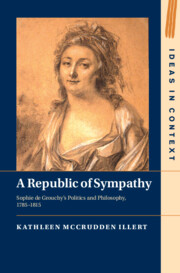Book contents
- A Republic of Sympathy
- Ideas In Context
- A Republic of Sympathy
- Copyright page
- Dedication
- Contents
- Acknowledgements
- Abbreviations
- Introduction
- Chapter 1 The Letters, 1786
- Chapter 2 The Wheel, 1785–1789
- Chapter 3 The Revolution, 1789–1793
- Chapter 4 The Republic, 1791–1793
- Chapter 5 The Publication, 1794–1799
- Chapter 6 The Mask, 1799–1804
- Chapter 7 The Poet, 1804–1810
- Chapter 8 The Thread, 1798–1815
- Conclusion
- Appendix: Attributions
- Bibliography
- Index
Introduction
Published online by Cambridge University Press: 18 December 2024
- A Republic of Sympathy
- Ideas In Context
- A Republic of Sympathy
- Copyright page
- Dedication
- Contents
- Acknowledgements
- Abbreviations
- Introduction
- Chapter 1 The Letters, 1786
- Chapter 2 The Wheel, 1785–1789
- Chapter 3 The Revolution, 1789–1793
- Chapter 4 The Republic, 1791–1793
- Chapter 5 The Publication, 1794–1799
- Chapter 6 The Mask, 1799–1804
- Chapter 7 The Poet, 1804–1810
- Chapter 8 The Thread, 1798–1815
- Conclusion
- Appendix: Attributions
- Bibliography
- Index
Summary
As well as providing a brief biography of Sophie de Grouchy, the introduction sets out the aims of the book. It describes how A Republic of Sympathy is the tale of how thought could be produced by an eighteenth-century woman in a time of Revolution: with all the possibilities, limitations, and opportunities that this period offered. It outlines how over this period, Grouchy developed her own, unique form of republicanism, by appealing to sympathy as the glue between the individual and the republic. It emphasises that Grouchy’s thought consisted of a series of shifting, adapting ideas, which nevertheless consistently relied on this sentiment. It describes how Grouchy not only experiment with variations of her theory over this period, but with different mediums of expressing her ideas: including pedagogical treatise, journal articles, translated texts, commentaries, collaborative projects, or embodied in her lived relationships. It also highlights Grouchy’s key interlocutors: from Adam Smith, to Jean-Jacques Rousseau, from her husband, the marquis de Condorcet to Benjamin Constant, from Thomas Paine to Jacques Pierre Brissot.
Keywords
- Type
- Chapter
- Information
- A Republic of SympathySophie de Grouchy's Politics and Philosophy, 1785–1815, pp. 1 - 15Publisher: Cambridge University PressPrint publication year: 2024

